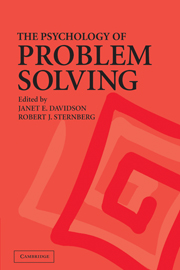Book contents
- Frontmatter
- Contents
- Contributors
- Preface
- PART I INTRODUCTION
- PART II RELEVANT ABILITIES AND SKILLS
- 3 Is Success or Failure at Solving Complex Problems Related to Intellectual Ability?
- 4 Creativity: A Source of Difficulty in Problem Solving
- 5 Insights about Insightful Problem Solving
- 6 The Role of Working Memory in Problem Solving
- 7 Comprehension of Text in Problem Solving
- PART III STATES AND STRATEGIES
- PART IV CONCLUSION AND INTEGRATION
- Index
- References
5 - Insights about Insightful Problem Solving
Published online by Cambridge University Press: 05 June 2012
- Frontmatter
- Contents
- Contributors
- Preface
- PART I INTRODUCTION
- PART II RELEVANT ABILITIES AND SKILLS
- 3 Is Success or Failure at Solving Complex Problems Related to Intellectual Ability?
- 4 Creativity: A Source of Difficulty in Problem Solving
- 5 Insights about Insightful Problem Solving
- 6 The Role of Working Memory in Problem Solving
- 7 Comprehension of Text in Problem Solving
- PART III STATES AND STRATEGIES
- PART IV CONCLUSION AND INTEGRATION
- Index
- References
Summary
Many years ago, I tried to go night skiing with some friends. We were driving to the mountain wishing we had checked the ski report to find out whether there would be snow, when suddenly we found ourselves in a blizzard. Cars were skidding off the road and getting stuck in large snowdrifts. The car I was in also went off the road, but the driver, who had never before driven in a blizzard, somehow managed to get it back on course. (I cannot tell you how he did this because I had my eyes closed.)
A similar situation occurs when people try to solve nonroutine problems. Nonroutine problems can be difficult because we do not possess preexisting procedures for solving them (Mayer, 1995). This difficulty is compounded when the givens, goals, and obstacles in the problems are not well specified. Under these conditions, there are times when we all go off track. Some people manage to get on course and successfully solve the problem; others remain stuck. In this chapter I claim that the ability to get on track when solving nonroutine problems often involves conceptual change and insight. In addition, getting on track in one's problem solving, after being off course, is frequently accompanied by a feeling of suddenly knowing what to do.
Insight has long been associated with creative thoughts and products. For example, Graham Wallas (1926) proposed four stages involved in the creative process.
- Type
- Chapter
- Information
- The Psychology of Problem Solving , pp. 149 - 175Publisher: Cambridge University PressPrint publication year: 2003
References
- 33
- Cited by

